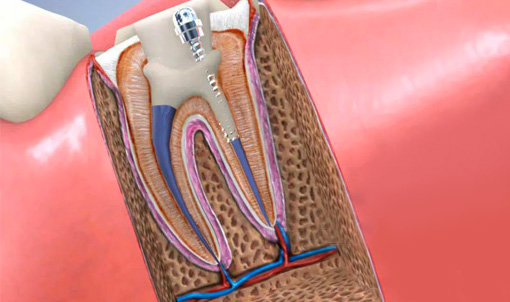A root canal is often the solution your dentist recommends when the innermost layer of your tooth (the pulp) becomes decayed, infected or damaged. Because the pulp contains the nerves in your tooth, infection or damage to it is painful.
Causes of Tooth Damage or Infection
There are various ways that the pulp or dentin in your tooth can be adversely affected.
- Deep decay. Bacteria get through the enamel (the hard outer tooth layer), into the dentin (still a mineralized layer but not as hard as enamel) and into the pulp (the soft layer containing the tooth’s nerves).
- Repeated dental procedures on a tooth. When outer layers get worn down to where the pulp is exposed, pulp damage can occur.
- Large fillings. When a large amount of the tooth is decayed, large fillings are often required, but this can sometimes affect the pulp.
- A crack or chip in the tooth. Bacteria can reach the pulp through the crack or chip and can result in infection.
- Trauma to the face. A severe impact to your face can cause your tooth to crack or result in loose teeth where the pulp also suffers injury.
(WebMD)
What About Pain After a Root Canal?
Despite the fact that the nerves in the tooth are gone after a root canal, you may experience discomfort after a root canal for a variety to reasons:
- Inflammation or swelling is still present that was caused by the initial infection.
- Chewing with the tooth right after a root canal can irritate it, and dentists often recommend not chewing with it for a few days after having a root canal.
- Inadequate or defective restoration allowed bacteria to get past the restoration and into the pulp and infect the area again.
If you had a root canal and experience persisting pain afterward, consult with your dentist about it.
At Hutto Hippo Family Dental, Dr. Baker is glad to discuss any issues you’re having with your teeth and to provide you with good dental care.







Recent Comments